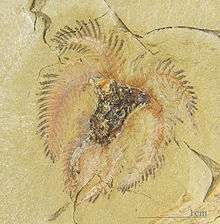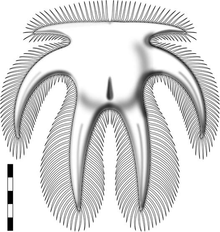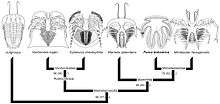Furca (genus)
Furca (Latin for "fork") is an extinct genus of Marrellomorph arthropod known from the Sandbian stage (upper Ordovician period) of the Czech Republic.[1] At least three distinct species have been described although they may all be synonyms of the type species, Furca bohemica. A tentative additional species, "Furca mauretanica": was proposed for specimens discovered in Morocco, but this species remains a nomen nudum until formally published.
| Furca | |
|---|---|
 | |
| Furca mauretanica | |
| Scientific classification | |
| Kingdom: | |
| Phylum: | |
| Class: | |
| Order: | |
| Family: | Mimetasteridae |
| Genus: | Furca Fritsch, 1908 |
| Type species | |
| Furca bohemica Fritsch, 1908 | |
| Species | |
|
Furca bohemica Fritsch, 1908 | |
Description

Furca is characterized by a broad head shield with three pairs of prominent spines: front (anterolateral), side (mediolateral) and rear (posterolateral). The head shield of Furca ranged from 21–31 mm (0.83–1.22 in) long and 18–29 mm (0.71–1.14 in) at maximum width. The mediolateral spines are long and strongly curved. The outline of the head shield possess a fringe of small, gently curving secondary spines, between 1.5–7 mm (0.059–0.276 in) long. Appendages are unknown from fossils.[2]
Paleobiology
Furca fossils have been found in sediments indicative of shallow marine habitats. Since appendages and other body parts are unknown, no firm conclusions can be made of the biology of Furca. However, comparisons to other marrellomorphs and living arthropods such as horseshoe crabs suggest a benthic marine lifestyle: dwelling on the sea floor.[2]
Classification

Furca is assigned to the Marrellomorph family Mimetasteridae, which also includes Mimetaster of the Lower Devonian. Other, more distantly related marrellomorphs include the well-known Marrella of the Burgess Shale as well the less-common Vachonisia and Xylokorys.[2]
Taxonomic history
With its unusual anatomy, Furca has a colorful taxonomic history. The first specimens were discovered by Joachim Barrande, who named them Furca bohemica (Latin for "Bohemian fork") but did not formally publish descriptions. The specimens were not illustrated until 1847, when they were interpreted as the hypostome of the trilobite Prionocheilus. Antonin Fritsch was the first to formally describe Furca as a distinct taxon, interpreting F. bohemica as a larval echinoderm in 1908.[3][4] In 1919, F. bohemica was, for the first time, interpreted as an arthropod. A second species, F. pilosa was described in 1999, as well as an unnamed species simply called "Furca sp.". In 2013, Rak and colleagues suggested that F. pilosa and all previously named species were synonyms of Furca bohemica.[2]
A tentative additional species, "F. mauretanica" from the Floian stage Upper Fezouata formation of Morocco, was proposed in a doctoral thesis in 2006[5] and subsequently referred to as "probably belonging to the genus Furca".[6] However, the name has yet to be formally published and so remains a nomen nudum.
References
- Rak, Štěpán (2009). "Výskyt netrilobitových členovců v křemencích letenského souvrství v okolí Berouna [The occurrence of non-trilobite arthropods from the quartzites of Letná Formation from the vicinity of Beroun". Geologie, paleontologie, speleologie - Český kras XXXV (PDF) (in Czech and English). pp. 14–25. ISBN 9788090347748.
- Rak, Štĕpán; Ortega-Hernández, Javier; Legg, David A. (2013). "A revision of the Late Ordovician marellomorph arthropod Furca bohemica from Czech Republic". Acta Palaeontologica Polonica. doi:10.4202/app.2011.0038.
- Fritsch, A. 1908. Problematica silurica. In: J. Barrande (ed.), Système silurien du centre de la Bohême. 28 pp. Bellman, Prague
- Fritsch, A. (1908). "Über eine Echinodermenlarve aus dem Untersilur Böhmens". Zoologischer Anzeiger. 31: 797–798.
- Van Roy, P. 2006. Non-trilobite Arthropods from the Ordovician of Morocco. 230 pp. Unpublished Ph.D. thesis, Ghent University, Ghent
- Van Roy, Peter; Orr, Patrick J.; Botting, Joseph P.; Muir, Lucy A.; Vinther, Jakob; Lefebvre, Bertrand; Hariri, Khadija el; Briggs, Derek E. G. (2010). "Ordovician faunas of Burgess Shale type" (PDF). Nature. 465 (7295): 215–218. doi:10.1038/nature09038. PMID 20463737.